
Chai tea has actually been popular for quite a while now. In addition to being a delicious beverage, the health benefits associated with this drink are well-known. However, the average tea drinker has barely scratched the surface of what chai tea is all about. To learn more about this drink and what it has to offer, keep reading.
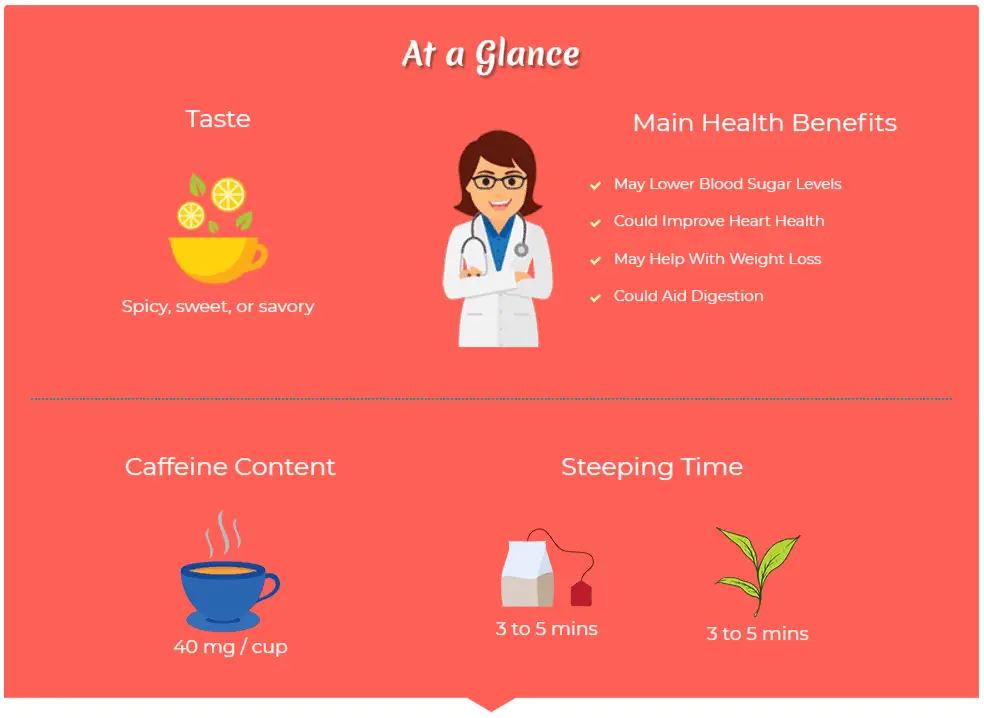
Contents
To begin with, let’s delve deeper into what this drink actually is. Technically, it doesn’t fall into its own category. This is because the base for chai tea is black tea. What sets this beverage apart, though, are its other components and how the drink is brewed.
Chai tea refers to a brew that consists of black tea and spices. The exact mix can differ from one region to another. In fact, the combination can actually vary from household to household. To a large degree, the resulting brew is dependent on the person making it.
This drink is served in most coffee and teashops around the world. However, it is quite different from the original drink. On this note, let’s look at the origins of this now-famous tea.
The true origins of chai tea are rather hazy. This is because some of it is shrouded in legend. Thus, it is difficult to really know where the drink came from. While the invention of the beverage is credited to India, some experts suggest that there may have been some Thai influence as well.
The more popular story is that the drink was introduced around 5000 years ago. It is said that a king ordered that a nourishing and restorative beverage be concocted to be used for Ayurveda practices. The original blend is presumed to have contained the following ingredients to produce chai tea benefits:
Interestingly enough, the earliest version of chai didn’t have any actual tea in it. As such, it was referred to as masala chai. In fact, tea and milk were only added to the brew thousands of years later, as a result of British colonization.
Once the British discovered a version of the tea plant in India, they began cultivating their favorite drink there. As the colonizers preferred strong black tea with milk and sugar, these ingredients were eventually added to the masala tea. Thus, chai tea was born.
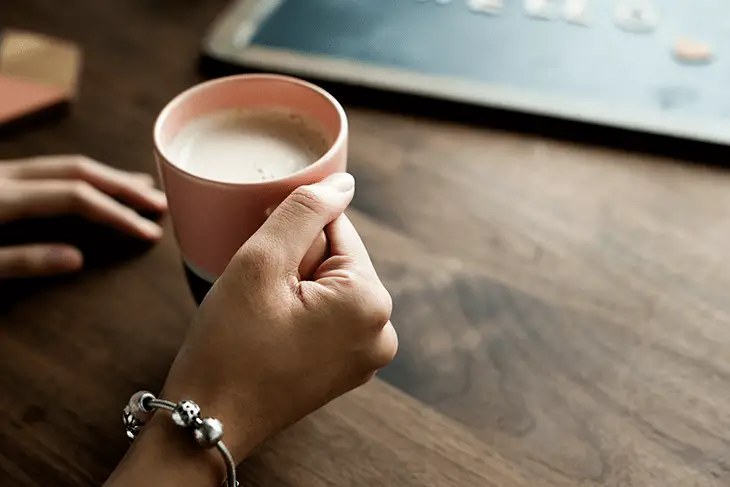
In many parts of the world, this drink is often referred to as chai tea. However, if you were to use this term in its country of origin, India, it would sound ridiculous. This is because the word “chai” directly translates to “tea”. So, to call the drink chai tea, you would actually be saying “tea tea”.
Chai is a derivation of the word “cha” which is the Chinese word for tea. It is assumed that the word underwent several transformations before the Mughals introduced the term to India, where the name chai stuck. Thus, to be grammatically and historically correct, it is best to refer to the drink simply as chai.
As mentioned, there is quite a bit of discrepancy involved in chai tea ingredients. The exact composition often depends on where the drink is made and who is brewing it. However, let’s consider some of the more common ingredients in the beverage:
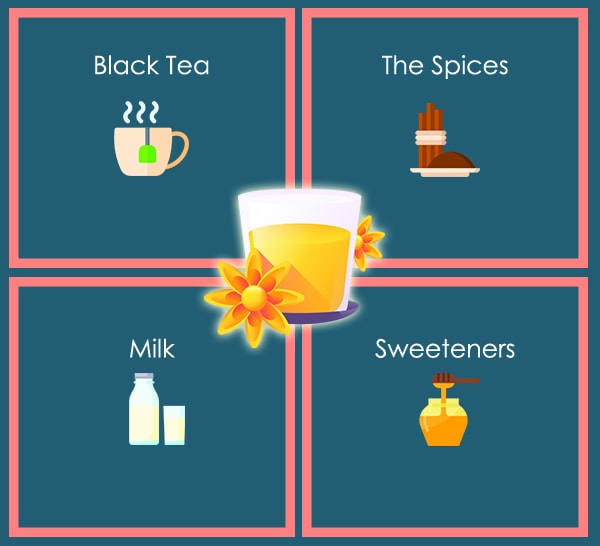
These days, black tea is practically a mainstay for all chai drinks. In India and in many parts of the world, either Assam or Darjeeling black tea is used as a base for the beverage. In recent times, though, some brewers have also used green tea and herbal teas.
Chai brews differ according to the spices used in the drink. These vary depending on the climate, region, and cultural preferences. In India, cardamom, cinnamon, pepper, ginger, and cloves are more likely to be used. Certain traditional recipes may also include star anise, nutmeg, vanilla, fennel, or mace. Certain western recipes will add allspice, bay leaves, saffron, cacao, coriander, and cumin.
Believe it or not, the same kind of milk isn’t used everywhere. In India, the type of milk will often depend on the region you are visiting. For instance, in Kolkata, brewers will use buffalo milk. In Rajasthan, however, the tea may be made with camel’s milk. In the West, cow’s milk is most commonly used. Nonetheless, there are quite a few people making the switch to non-dairy milk. As such, it isn’t unusual to find chai drinks made with soy, almonds, and other plant-based milk.
There is some discrepancy in the kind of sweeteners used as well. Now, white and brown sugar, as well as honey, is popular enough. At the same time, coconut and cane sugars such as demerara, turbinado, and jaggery are used as well. These days, of course, non-caloric sugars are used too.
It can be tricky to narrow down the flavor profile of chai. This is because, for the most part, the taste is based on the ingredients added to the black tea. As a result, it can often be an interesting mix of spicy, sweet, and savory.For instance, if you were to add vanilla or nutmeg to the drink, it would undoubtedly take on a sweeter taste. However, if there were stronger notes of cacao or saffron, then you would get a savory hint. On the other hand, if there was a distinct taste of either ginger or pepper, then you would consider the brew to be spicy.

Most people are confused about the chai tea caffeine content and whether caffeine is even added to the drink. As chai contains black tea, there is caffeine in this drink. However, the content is much lower than that of a cup of coffee.
It should also be noted that the caffeine content can vary quite a bit from one brew to another. This is because the total capacity is based on a number of factors. So, the blend of the tea leaves and how it is processed can play a big part in how much caffeine is in the drink. Naturally, how you brew the tea can have an impact as well.
As mentioned earlier, chai tea was initially created as a nourishing beverage. Due to this, there are a number of health benefits associated with it. At the same time, there is some confusion regarding what is chai tea good for. This is because the exact benefits of the drink largely depend on the ingredients. So, let’s take a look at what some of the advantages of this drink could be:
If your chai includes ginger, cinnamon, or both, there is a good chance that your blood sugar levels will improve. Now, one of the reasons that your blood sugar levels can be elevated is due to insulin resistance. Your body combats the effect of insulin which is responsible for the transfer of sugar from your blood and into your cells.
Fortunately, it has been found that cinnamon can help to lower insulin resistance quite a bit. As such, the sugars can be used up more effectively, automatically lowering blood sugar levels. It can be helpful in the prevention or even treatment of type 2 diabetes.
There has also been quite a bit of research done into the effects of ginger on people who have been diagnosed with diabetes. It has been discovered that both hyperglycemia and hypoinsulinemia were lowered a great deal. As a result, blood sugar levels were adjusted more effectively.
There is also some evidence to suggest that cinnamon can help to ward off cardiovascular diseases. To begin with, cinnamon works to prevent the build-up of cells or other substances within the cardiovascular system. As a result, it can reduce the risk of the development of atherosclerosis and vascular diseases.
Furthermore, cinnamon is shown to reduce the effects of bad fats and cholesterol within the body. These components play a rather significant role in the development of various heart issues.
Thus, this can help to prevent a number of issues. In addition to cinnamon, black tea can also improve heart health quite a bit. This is because it is adept at reducing cholesterol levels within the body. This, too, can help prevent a number of cardiovascular diseases.
Of all the chai tea benefits weight loss is one that has most people excited. While there are certain components that can help you reduce your weight, the results aren’t quite so straightforward. At the end of the day, how you drink your chai is quite important.
The good news is that black tea has been determined to help in the weight loss department. Studies have shown that this tea can make it easier to reduce your overall body weight. At the same time, it is quite useful in reducing visceral and abdominal fat too.
There is also the fact that chai contains milk. Most kinds of milk contain protein and this can help to satiate your hunger. Due to this, you are much less likely to get hungry during the day and will not consume as many calories. Naturally, this will make it easier for you to lose weight.
If your chai brew contains cinnamon, cloves, and cumin, then this is certainly great for you. All these three ingredients have been found to have antibacterial properties. In particular, they are effective against a bacteria known as Staphylococcus aureus which can result in nausea, vomiting, and diarrhea.
Ginger, too, is great for reducing the impact of nausea and is often used as a natural remedy. What’s particularly useful about ginger is that it is safe enough for pregnant women. As such, it can be used to treat morning sickness.
Black pepper, on the other hand, is great if you want to improve your digestion. To start with, it stimulates the digestive enzymes which make it easier for you to digest your food. At the same time, it can reduce the gastrointestinal transit time, cutting down on how long it takes for your food to be digested.
While there are numerous health benefits associated with chai, there are a couple of things that you should be wary of as well. To start with, it is important to limit your intake of chai to around three cups a day. Keep in mind, the drink does contain caffeine, so drinking any more than this could leave you jittery.
Chai is often sweetened. This is especially true in the case of coffee or teahouses. As you know, drinking too much sugar in any form isn’t good. So, either limit how much chai you drink or switch to non-calorie sweeteners. Making the drink yourself can also make it easier to control how much sugar goes into the drink.
The same thing can be said for the milk added into the drink. While milk does contain protein, it contains fats as well. Consuming too much milk can lead to weight gain and may compromise your cardiovascular health. So, you may want to switch to a low-fat or healthier version.
Last but not least, spices can have varying effects on individuals. So, while they can be quite healthy for most individuals, they may be harmful to others. This is why it is best to always consult a doctor before drinking chai on a regular basis.
When it comes to picking the perfect chai blend, the rules aren’t quite as clear-cut as you would imagine. This is largely to do with just how different one batch can be from another. Still, there are some guidelines that you can follow to select a higher-quality tea.
Related Article
A L’il Bit of Sugar and a L’il Bit of Spice: How to Find the Best Chai Tea
To begin with, make sure that the black tea is good quality and from a reputable source. This can help to maintain the freshness of the tea and set the right tone. Once you ascertain this, you can move onto the other flavors.
Of course, when selecting the spices, it is up to you to choose which blend is most suitable. What you should make sure of, however, is that they are natural ingredients and not extracts, essences, or artificial flavorings. The real ingredients are what will help the flavors really come through.
Finally, always give the blend a whiff when buying it. The aroma is often indicative of strength and freshness. So, if it smells good, then there is a much better chance that your cup of chai will taste pretty good too.
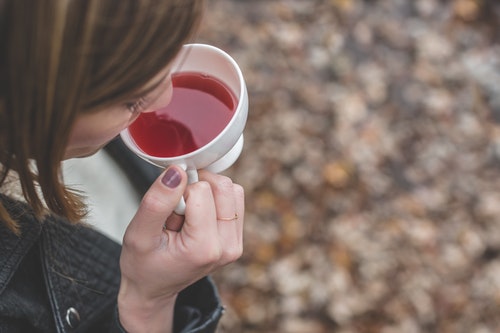
If the blends on the market are disappointing, then your next option is to try your hand at homemade chai tea. This way, you can mix tea and spices together to get the kind of brew that you want.
It is up to you to experiment with the various combination of spices to determine what you like best. To keep the ratio in balance, though, add two or so grams of black tea for every 6 tablespoons of spices. Of course, this is something you can adjust, depending on your taste buds.
It is important to keep your chai in an airtight container. This way, the ingredients can remain fresh. At the same time, the odor of other substances can’t make its way into the blend. Even so, it is best to keep the chai away from other ingredients that may have strong odors.
To maintain the freshness of your chai, keep it in a dry and cool place, away from sunlight. A pantry cupboard should do this perfectly.
Chai is quite versatile and can actually be brewed in a number of ways. As a rule of thumb, though, rely on these guidelines:
If you are using black tea, then take the water off the stove when it comes to a boil. Then, steep the tea for 3 to 5 minutes. For green tea, don’t boil the water completely. Also, you should only steep the tea for 30 to 60 seconds.
Here are some ways you can make chai:
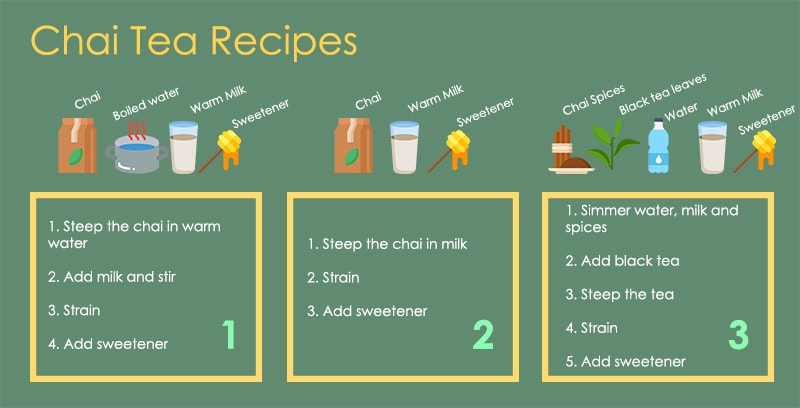
Let the chai steep in the warm water for several minutes. Then, add the milk and stir well. Strain the mixture and add sweetener to taste.
Allow the chai to steep in the milk for several minutes. Strain the mixture and then add sweetener to taste.
Bring the water, milk, and spices to a simmer. Reduce the heat and add the black tea. Steep the tea for around three to five minutes. Strain the liquid into a cup. Add sweetener to taste. It is clear that there is quite a bit of versatility surrounding chai. This includes its ingredients, how it is brewed, and more. Of course, now that you know more about this delicious tea, you can decide which blend and recipe are best suited to you. Thus, you can now enjoy a more creative cup of chai.
If you love chai tea more than anything else, then head over to our Pinterest page! There are plenty of other recipes and hints to check out as well.
